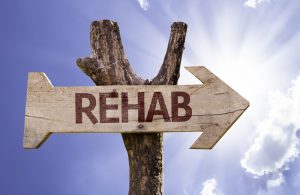
Most California DUI sentences do not result in rehab or drug/alcohol treatment—but some do. Judges have a wide discretion in choosing a DUI sentence. As part of probation, they can order community service, AA meetings, a SCRAM ankle bracelet or an ignition interlock device. But out of all the sentencing possibilities, rehab is perhaps the most difficult.
Nonetheless, rehab can be better than jail or prison time, and there are some cases where you should consider voluntarily entering rehab. To understand why, let’s look in detail what rehab is and when it might affect your DUI case.
What is Rehab?
Rehab is short for rehabilitation treatment. It’s very different from AA meetings or even a live-in sobriety program. When you enter rehab, the presumption is that you have a serious chemical dependency that’s affecting your health and your life. You will go through a difficult process of completely quitting alcohol and drugs.
Rehab usually has three stages:
- Detox. Detoxification or “detox” is the process of getting all drugs and alcohol out of your system. You will be supervised and prevented from using any substance. During this time, your body may experience both physical and mental changes. Many recovering addicts feel ill, depressed or anxious as they detoxify. Rehab staff will make sure you recover and provide you with the support you need, including medicine.
- Rehabilitation. After the detox you will remain at the rehab center and work to address the causes of your addiction. You may be involved in both group therapy and private therapy sessions. The goal is to help you come to terms with the transition and set a course for your new life.
- Aftercare. After you are released from rehab you will continue to attend support groups and/or counseling. You might also live in a sober living facility for a period of time or long term.
As you can see, rehab is a major change in your life. It can be very positive for individuals who need it. But it involves time away from your home, job and friends and the expectation is a permanent change in your life.
When Does a Judge Order Rehab?
Judges order treatment when they believe that alcoholism or chemical dependency contributed to a defendant’s DUI. However, rehab is not always the type of treatment they order. It is much more common to order that you simply attend AA meetings or a similar support group. Rehab is considered a more serious step.
In practice, a judge might consider court-ordered rehab if any of the following apply:
- You have had multiple previous DUI’s
- You have a pattern of behavior involving drugs and/or alcohol
- Drugs or alcohol have affected other parts of your life, such as work, marriage, or child custody
- You admit you are an alcoholic/drug addict
- Previous deterrent programs have not helped
What Happens if I Don’t Go?
Court-ordered rehab is not optional. If you are ordered into treatment, you will be required to document that you began, attended and completed the program. The provider must be an organization licensed by the state of California. If you cannot provide the documentation it will be considered a violation of your probation.
Violating your probation means you could be arrested and brought before a judge. The judge may send you to jail (with added time for the probation violation) or take other action. You may end up being ordered back into rehab anyway, possibly after a short stay in jail.
Does Voluntary Rehab Help My Los Angeles DUI Case?
You do have another option: check yourself into rehab (or a treatment program) voluntarily. Many DUI defendants choose to start treatment before they’re sentenced—often before their trial has even begun.
This may be a good idea if you suffer from alcohol or substance abuse issues. It can also have advantages in terms of your DUI case:
- Voluntarily starting treatment shows the judge you are serious about turning your life around. It can lead to a more lenient sentence.
- If you start treatment on your own, you can choose the treatment program you want to attend. The judge is unlikely to order you into a different program and more likely to order you to complete the one you started.
The bottom line is that entering treatment may lead to a reduction in jail time or fines, and may be a positive step for your life overall. You should speak to a DUI lawyer about whether treatment will have an impact on your case.
We can connect you with a Los Angeles DUI lawyer who has the experience to help you. We will get you a FREE consultation so you can get a professional legal opinion with no obligation. Just fill out the form to the right or call (310) 896-2724 and get your free consultation today.






